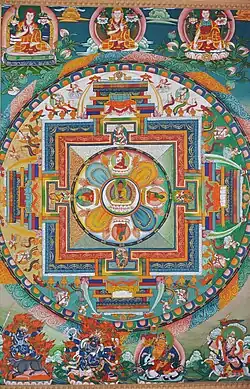Manjusri Vasthu Vidya Sastra
Mañjuśrībhāsitacitrakarmaśāstra (Treatise on iconography as spoken by Mañjuśrī) is a Sinhalese Buddhist text dealing with construction of monasteries and Buddhist temples.[1]
Description
A single manuscript of this text, written in Sanskrit language in Sinhalese script, was acquired by S. Paranavitana in 1950s from a Buddhist temple in Gampola. After his death, it was acquired by the National Archives of Colombo in 1972. The text appears as a dialogue between Manjushri and Viswakarma. Given the ample references to application of mantras and fire-ceremony in consecration of monasteries and temples, with the invocation of the 5 Buddhas, it is of evidently a Vajrayana nature. Based on its Vajrayana content and application of Sinhala script, the text can be dated to be from 11th century.[1]
Content
Although previously, texts on Buddhist iconography like the Bimbalakṣaṇa ascribed to Śāriputra had been found in Sri Lanka, this text was larger than the others. It consists of 1,600 slokas divided into seventeen chapters. These discuss
- Characteristics of ideal locations for construction activities
- Twenty four types of monasteries
- Varieties of caityas
- Collection of suitable wood for construction
- Dimensions for building construction
- Setting the ground-plan for temples
- Construction of idols
- Construction of idols (continued)
- Construction of idols (continued)
- Construction of idols (continued)
- Construction of idols (continued)
- Construction of idols (continued)
- Dimensions for idol construction
- Description of plumb lines
- Iconography of the Five Buddhas
- Preparation of pigments for painting
- Consecration of idols
Regarding the procedure of idol construction and consecration rituals, the text heavily borrows much of its content from shilpasastra texts circulating in South India.[1]
Publication
In 1989, the text was published in two volumes from New Delhi with the Sanskrit original rendered in Devanagari script and English translation under the name of The Vāstuvidyā ascribed to Mañjuśrī, edited by Dr. E. W. Marasinghe, librarian of the University of Perandeniya. The first volume, covering the first three chapters was titled Mañjuśrībhāsitavāstuvidyāśāstra (Vāstuvidyā as spoken by Mañjuśrī).
References
- Marasinghe, E. W. (1989). The Vastuvidya Sastra ascribed to Manjusri (Sanskrit Text with English Translation). Sri Satguru Publications. ISBN 8170301998.
- ^ a b c Wu, Weilin (2024-01-24). "A Patchwork of Hindu Ritual Practices and Technique Performances? A Re-Examination of the Citrakarmaśāstra, a Vajrayānic Sanskrit Śilpa Text Discovered in Sri Lanka". Religions. 15 (2): 146. doi:10.3390/rel15020146. ISSN 2077-1444.

